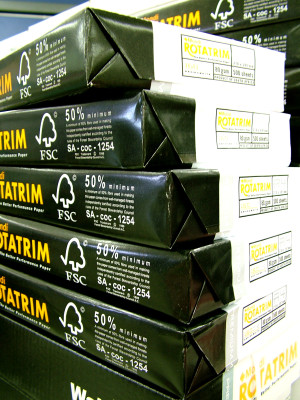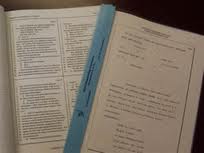 Many law firms are beginning to do their part to save the environment by implementing recycling programs and other strategies. Even the smallest changes can mean big results. For law firms, reducing the amount of paper used during the course of business is a large area in which they can decrease their carbon footprint. There are several ways your court reporter can help you reduce your paper use.
Many law firms are beginning to do their part to save the environment by implementing recycling programs and other strategies. Even the smallest changes can mean big results. For law firms, reducing the amount of paper used during the course of business is a large area in which they can decrease their carbon footprint. There are several ways your court reporter can help you reduce your paper use.
Order a Copy Transcript
When you order a transcript, the ordering party will traditionally receive an original transcript that is sealed in a paper envelope and a copy of the transcript for your use. The sealed transcript is necessary at the time of trial when you need to file the original transcript with the court. However, many lawsuits settle before making it to trial. One way to save paper is to have the copy printed for your use when you order the transcript, but you can ask that the original not be printed and sent until you request it at the time of trial. You can imagine how much paper this would save if everyone used this practice.
Electronic Transcripts
You may also consider receiving your copy of the transcript in electronic format instead of hard copy. Ordering electronic transcripts to be emailed to you again allows you to hold off on printing the transcript unless and until the time you actually need the testimony in paper form. You may also decide to only print out a partial transcript or a condensed transcript from your electronic copy in your office. Transcripts that are emailed to you can be saved to your firms’ client folders and can also be accessed at any time.
Electronic Exhibits
Not only can you order electronic transcripts, but you can order electronic exhibits as well. Your court reporter can take the exhibits and have them scanned into digital form to include with your transcript. At O’Brien and Bails Court Reporting, we are able to digitally link your electronic exhibit to the pages in the transcript where the exhibit is mentioned. This makes it easy for you to refer to the exhibit while you are reading the transcript. Ask your court reporter if this is a service they can provide.
Paperless Saves
Conserving on paper by requesting electronic transcripts not only saves the environment, but using less paper can also save you money in a couple different ways.
Saving Space
You will save on space at your firm or storage facility by having less paper to keep in active files and closed files. This can also save you money because you will need to purchase less storage space for files.
Saving Money
Ordering electronic transcripts saves you money in postage. Your court reporter will incur less in postage expenses because less paper will be sent through the mail. It is likely that your court reporter will pass that savings on to you.
Green Discounts
Using these green strategies means your court reporter will be using less resources to produce your transcripts. Some court reporting firms pass that savings on to you in the form of a green discount. For instance, at O’Brien and Bails Reporting, we offer a 5% discount if you order transcripts in these forms that use less paper. We want to help you in your efforts to reduce your carbon footprint. Not all court reporters offer this green discount, so be sure to ask the next time you hire a court reporter.
Reducing your carbon footprint can be accomplished in a lot of different ways. Reducing the amount of paper your firm consumes is a good idea for you and for the environment. Try out these creative ways in which your court reporter can help your law firm in its effort to go paperless.
If you enjoyed this article, you might also like to sign up for our free guide, “How Much Should I Expect to Pay For Court Reporting Services?”
 Like most businesses these days, law firms are becoming increasingly interested in managing the carbon footprint of their offices. Not only is it a good idea for the environment, it can also be good for business. Consumers care about the environment and feel good about doing business with a law firm that cares also. Implementing a program for recycling office computers and electronics is a good way to reduce your office’s carbon footprint.
Like most businesses these days, law firms are becoming increasingly interested in managing the carbon footprint of their offices. Not only is it a good idea for the environment, it can also be good for business. Consumers care about the environment and feel good about doing business with a law firm that cares also. Implementing a program for recycling office computers and electronics is a good way to reduce your office’s carbon footprint. As any experienced attorney will tell you, there is a skill to taking a deposition that reads well for use in court. As court reporters, we are keenly aware of the inconsistencies that can occur when the spoken word is taken in a deposition and turned into a written transcript. Something that made perfect sense when spoken may appear to have a different meaning when read on the page. These speech habits can cause big problems when it comes time for a judge, witness, or jury to read the transcript.
As any experienced attorney will tell you, there is a skill to taking a deposition that reads well for use in court. As court reporters, we are keenly aware of the inconsistencies that can occur when the spoken word is taken in a deposition and turned into a written transcript. Something that made perfect sense when spoken may appear to have a different meaning when read on the page. These speech habits can cause big problems when it comes time for a judge, witness, or jury to read the transcript. A common question I am asked by attorneys is “When can I expect to get my transcript?”
A common question I am asked by attorneys is “When can I expect to get my transcript?” Legal assistants are a necessary, important part of any law practice. The best legal assistants provide integral support for attorneys and clients. An assistant with exceptional skills is a valuable asset to a legal office.
Legal assistants are a necessary, important part of any law practice. The best legal assistants provide integral support for attorneys and clients. An assistant with exceptional skills is a valuable asset to a legal office.